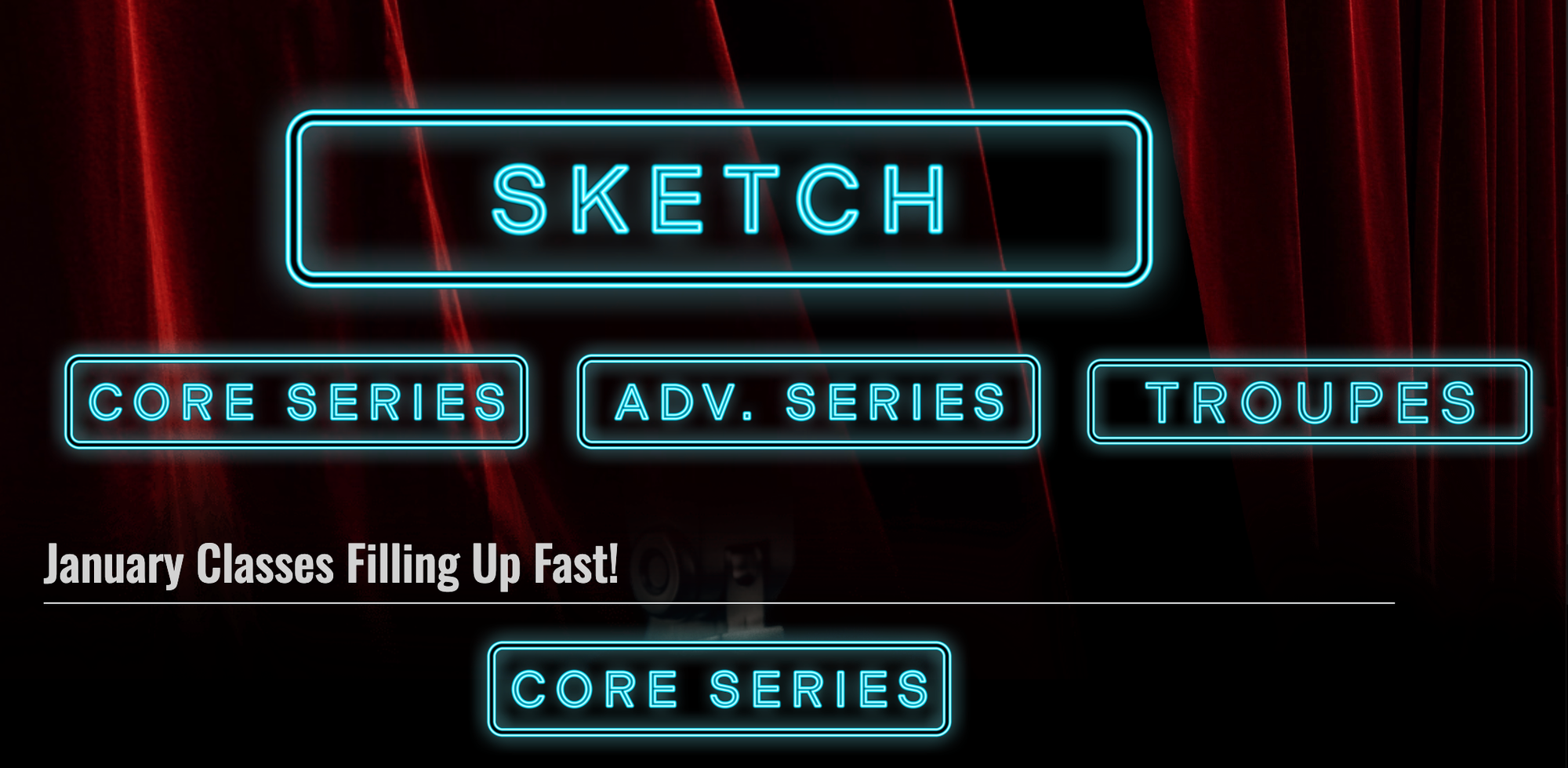Advice to sketch comedy artists (but it applies to any stage artist)
As we begin a new calendar year, I look back on some advice I gave to sketch comics more than a decade ago

A long-time publicist recently DM’d me with screen caps of something I’d written more than ten years ago. “Still great advice,” she wrote. I looked it over and kinda had to agree. Things have changed in the entertainment and media industries, but many of the things I wrote still apply.
First a little context. Apparently, as one of the city’s few (only?) arts journalists who regularly wrote about comedy (at NOW Magazine, RIP), I had been invited to an afternoon panel on sketch comedy marketing. I was unable to attend (I’m sure I was at a matinee), but supplied this 12-point list of “pet peeves & other observations” instead.
These days, as a freelancer, I don’t get to see as much comedy as I’d like. One of the nice things about being on staff at NOW was that I was free to pursue whatever interested me.
Because I was on salary, I regularly checked out comedy shows at the few stand-up clubs and also at the weekly, biweekly or monthly shows at places like the Rivoli, Clinton’s and, starting in 2008, Comedy Bar. (I loved late night sets, because I could catch a play and then scoot across town and watch a 10:30 show that ended after midnight.)
I wasn’t necessarily on assignment, but if a comic caught my attention I would write something or, if I was thinking of a feature, file away my notes and impressions for later. Covering comedy — stand-up, sketch, character work, improv — was thrilling back then because it was always unexpected, truly different every night. Plus, comics could come from any background. Unlike, say, theatre artists, there was no school-to-stage pipeline — which changed, of course, after the Humber program began.
Anyhow, here’s that two-page bit of advice, reprinted in full. I’ve added a few notes, in italics, after items. Thanks to Damien Nelson for sending it along.
Pet Peeves
Pet Peeves & other observations from a full-time critic who sees a lot of comedy by Glenn Sumi (2014)
Speaking of “peeves,” a year-and-a-half ago I wrote a similar sort of piece for the Toronto Star, but this one was mostly aimed at audience members. A brilliant editor there gave it the headline “Peeves & Queues” in the print version. The digital version is here.
- Peeve: Press releases that don’t have complete info. Always make sure the what/when/where is present and correct. I’ve received releases missing date, time and venue. Seriously.
Alas, this still happens, in various forms. Day and date don’t match up. Venue has wrong address. At NOW, back in the days of snail mail, I used to cut out all the misspellings of my names. These included: Glen Summi and Glenn Kaplan, which made my colleague and friend Jon Kaplan smile. I’ve also received emails about Intermission — be extra careful when cutting and pasting!
- Avoid sending props and cute promotional things to the office. The best way to get my attention (if you’re a comic) is to be funny. Feel free to include Vimeo links, YouTube videos, etc. If you have an album, send me a link or code. I may not listen to it right then — or in the next few weeks — but feel free to send me emails, nudge me, and I will. If I like it I will get in touch. If I listened to /watched it and I don’t say anything, chances are I wasn’t blown away.
The comedy scene has radically changed in the last decade. I can’t imagine a comic — especially a stand-up — without some sort of video presence. TikTok and Instagram have created huge careers. And with Spotify and Apple Music, it’s so easy to download and stream comedy albums. But these days, if you’re trying to get a journalist’s attention, perhaps curate and embed these clips or links in an email? Then again, you probably don’t need a journalist’s attention because you’ve acquired a massive following on your own. So there’s that.
As for the cute promotional things, I no longer work in an office. And I still have a mug that had included the title of an indie show along with the NNNNN rating for the java, which makes me smile whenever I drink from it.
Make sure your show is ready before you ask reviewers to see it
- On a related note, one stand-up comic gently asked me to see his headlining week. He was from out of town, and in Toronto a couple times a year. He made sure months in advance that I knew when he’d be there and reminded me a few weeks before. I caught the act and he was great. I wrote a couple of sentences about his show online, praised him on Twitter and told him via email to tell me when he was performing next. He did, gently nudging me but in a polite way a few months, a couple months, and then a month before. I ended up writing a feature on him. When we met he said: “I know what journalists’ schedules are like. You’re handling a zillion things, not just whether or not to write about me.” And that was so true. The point is: If I like your act, I will want to write about you later. If I don’t, I won’t. Which leads to:
- Make sure your act is very good before you ask me to see it. If you keep pestering me and asking me to come and your act isn’t there, I’m probably not gonna give you a shot for a while. There’s too much else out there to see. I see about 280 shows a year.
Okay, there’s a lot to unpack here, as they say. I think the comic I was referring to in #3 was John Hastings, but maybe it was Dom Paré, both excellent. I still find many young and/or inexperienced artists believe their show/act is the only thing that’s going on in the world. I’m cringing at my arrogance in #4 about not giving someone a shot for a while, even if it was true. And these days I probably attend about 150 shows, not 280.
- See as much as possible. See what works and doesn’t work for other troupes. And try to see stuff outside your genre. If you’re in sketch, study stand-up, improv. Go see great character comics. What’s amazing is that often the same rules apply. A brilliant performer like Mike “Nug” Nahrgang or Naomi Snieckus will make their improvised scenes specific — details are golden — and will clearly give you a sense of who the character is, what s/he wants and offer up a surprise or two. They’ll also teach you how important it is to broaden your scope of references.
This is pretty key. These days, it’s obviously easier to see other comics’ work on a screen, but try to see them with a crowd. You’ll also learn a lot from a live audience: where the laughs are coming from, where people shift in their seats, who is AT the show.
- Don’t just concentrate on the “look” of a show. Great production values (props, wigs, fancy costumes) can’t hide week writing. Then again, learn about tech. It’s amazing how lighting and sound can help enhance a scene.
No notes. Applies to theatre and film equally.
Consult a director/dramaturge
- For sketch troupes: Get an outside eye to look at your work, preferably someone with directing or sketch experience. After seeing a crappy sketch troupe, I’ve often thought: They are so inside the process that they can’t see it objectively. Also keep in mind that often people will laugh at anything: a bizarre wig, a hokey accent, a catchphrase. When they go out, people generally want to have a good time and so they want to laugh. It doesn’t mean what they’re seeing is really funny, however. It’s amazing how much you can learn when a professional you don’t know — someone who has no personal investment in this — looks at something. Which leads me to a very important point:
- It’s not personal. Just because I don’t like your act doesn’t mean I don’t like you. And remember: I want to see good things. I want to write good things about good people.
Again, lots to unpack here. #7 is crucial in any performing art. At the time, I was probably thinking of the incredible director, writer, dramaturge, actor, teacher Shari Hollett when I was writing this. But it could apply to anyone who’s been through the process of creating a show and putting it onstage.
#8 gets to the heart of what I do and probably explains why criticism or reviews are often misinterpreted or maligned. We do not want to pan shows! We want to like things! And we want to spread that joy and enthusiasm to others who love this art form! On the other hand, we’re not cheerleaders and/or an extension of your company’s publicity team. The best marketing and PR folks understand that.
- You can get better. I see it all the time and it’s one of the aspects that makes this job so satisfying: [witnessing] comics who are perfectly fine who keep at it, keep digging, trying new things, finding their voice and then suddenly turn a corner and have got it. It’s that weird X factor.
There’s something off about the grammar in this section, but what the hell. I see artists turn a corner all the time in comedy and theatre, and it is always thrilling.
- Start your show on time, give or take.
Might be obvious, but I remember some monthly or bi-weekly shows starting really late. Such a pain.
- I get people tweeting to me about their shows, and that’s fantastic. I usually look at my schedule and see if I can fit it in. Only thing I’d ask is to please be polite. If I can’t make it don’t insult me or be sarcastic. (I usually see between 5-7 shows a week.) Tagging me is cool. Just keep in mind #4. And also: if you’re funny on Twitter or other social media, you’ve already got my attention.
RIP, Twitter. And everyone knows how influential TikTok and Instagram have been for comedy. One thing I haven’t quite figured out is whether to “tag” artists I’m about to see before I see it, for instance: “About to see X in Y. Hope it’s a great show!” (or something less fatuous). I’ve heard from some artists that it can freak them out if they know media is in the house, which I understand; but on the other hand, if they’re professional, shouldn’t they be prepared for anyone to be there? Another thing I haven’t quite grappled with is artists sneaking into one’s DMs to publicize a show. Emails are preferable — and much easier to search.
- There are no rules in comedy. So take everything I’ve said above with the proverbial grain of salt.
Amen. Happy new year, everyone!
